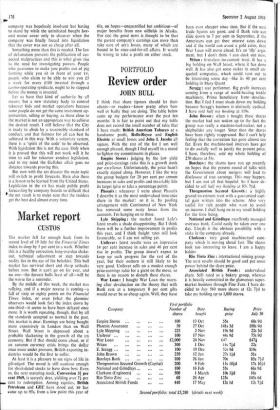Market report
CUSTOS
The market fell far enough back from its record level of 19 July for the Financial Times index to drop by 5 per cent in a week. Whether this is a healthy correction, long-overdue shake- out, technical adjustment or step towards reality lies in the eye of the beholder. This bull market has survived short and sharp setbacks before now. But it can't go on for ever, and no one—the fiercest bulls least of all—will be the worse for a reminder.
By the middle of. this week, the market was rallying, and if a major reverse is coming—a fall of sixty or eighty points on the Financial Times index, or even (what the gloomier observers would look for) the index down by one-third—it seems to have been delayed once more. It is worth repeating, though, that by all the standards accepted as normal in the past, this market is dear. Earnings are being bought more expensively in London than on Wall Street. Wall Street is depressed aboht a probable slackening in the growth of the us economy. But if that should come about, or if an autumn currency crisis brings the dollar once more under pressure, British exporting in- dustries would be the first to suffer.
At least it is a pleasure to see signs of life in gilt-edged. The mood is still cautious enough for short-dated stocks to have done best. Even so, the next maturing stock, Conversion 34 per cent 1969, is scarcely dear, yielding over 7; per cent to redemption. Among equities, British Petroleum and GEC have stood out. BP has come up to 95s, from a low point this year of 61s, on hopes—unquantified but ambitious—of major benefits from new oilfields in Alaska. For GEC the good news is thought to be that the parent company's earnings can more than take care of AEI's losses, many of which are bound to be once-and-for-all affairs. It would be wrong to take a profit on either stock.






































 Previous page
Previous page